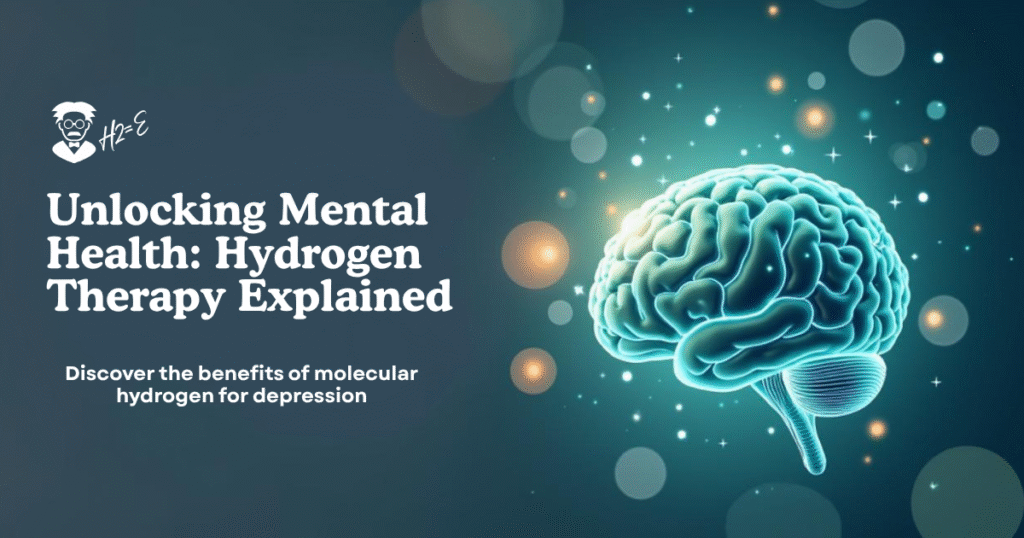Understanding Molecular Hydrogen Therapy
Molecular hydrogen (H₂) therapy involves introducing molecular hydrogen into the body. This can be achieved through various methods, including drinking hydrogen-rich water, inhaling hydrogen gas, or taking hydrogen tablets.
Unlike regular hydrogen bond to water, molecular hydrogen gas is a small, non-toxic molecule that can easily penetrate cells and cross the blood-brain barrier, making it uniquely accessible to all tissues and organs.
How Does It Work?
The therapeutic effects of molecular hydrogen are primarily attributed to its potent antioxidant and anti-inflammatory properties. Here's a breakdown:
- Selective Antioxidant: H₂ selectively neutralizes harmful free radicals, specifically targeting the most cytotoxic ones like hydroxyl radicals (•OH) while leaving beneficial reactive oxygen species (ROS) intact.
- Anti-Inflammatory: H₂ modulates inflammatory pathways, reducing the production of pro-inflammatory cytokines. Chronic inflammation is increasingly recognized as a significant contributor to depression.
- Neuroprotective: By reducing oxidative stress and inflammation in the brain, H₂ protects neurons from damage and promotes neuroplasticity, the brain's ability to reorganize itself by forming new neural connections.
The Science Behind H₂ and Depression
Several studies suggest a potential role for molecular hydrogen in alleviating depressive symptoms:
- A randomized, placebo-controlled study published in Medical Gas Research found that drinking hydrogen-rich water for four weeks significantly improved mood and reduced anxiety in participants.
- Animal studies have demonstrated that H₂ can protect against stress-induced depression-like behavior. Researchers believe this is due to H₂'s ability to modulate the gut-brain axis and reduce inflammation.
- Research indicates that H₂ may influence neurotransmitter systems involved in mood regulation, such as serotonin and dopamine. More research is still required to fully understand this mechanism.
Practical Tips for Trying Molecular Hydrogen Therapy
If you're interested in exploring molecular hydrogen therapy, you will see in our shop page our hydrogen and oxygen machines. All of our models from The Vitality, The Super Power to The Immortal will help reduce anxiety and improve mood. Also, on our product pages we have a starter protocol which shows you how to start slowly and build up with a hydrogen and oxygen protocol, combining inhalation and making molecular hydrogen water. Hydrogen therapy is very effective yet often is part of the picture, if combined with other therapies you can get even better results.
What Else Combines well with Hydrogen Therapy for Depression
If you are on medication, please consult with your doctor first if any of this suggestion will suit you. The health supplements worth considering are: -
- A hair mineral test
- St. john's wort (Best taken in the morning)
- Ashwagandha (Best taken in the morning)
- A Multi complex B vitamin (Best taken in the morning)
- Vitamin D3 5000 IU a day
- Phosphatidylserine (Best taken before Sleep)
- In the evening if you combine Apigenin and Mag Glycinate, this can help with relaxation.
- Omega 3 in the evening
- Alot of your happy chemicals are made in the gut, so making your own fermented veg and l reuteri yogurt can help look after your gut flora that helps to make these happy chemicals.
- Plus, the commonsense things help a lot reducing or avoiding alcohol, coffee, processed foods, seeds oils. Having a low carb diet.
Apigenin For Relaxation
The formula for reducing anxiety and for relaxing using the Apigenin, Phosphatidylserine and Mag Glycinate, we have had really good feedback. If you would like to try the relaxation effect of Apigenin, the image below is an Amazon link of one of the best voted Apigenin supplements.
Summary
Molecular hydrogen therapy shows promise as a potential adjunctive treatment for depression due to its antioxidant, anti-inflammatory, and neuroprotective effects. While scientific evidence is still evolving, early studies suggest that H₂ can improve mood and reduce anxiety. If you're considering trying molecular hydrogen therapy, it's essential to consult with your doctor and choose reputable sources for H₂ products. Remember, H₂ therapy should not replace conventional treatments for depression but may offer a complementary approach to supporting mental well-being.


